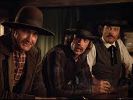Eye For Film >> Movies >> The Long Riders (1980) Blu-Ray Review
The meat of Second Sight's package of extras for The Long Riders is the 60 minute long Making Of documentary, which features in-depth interviews with director Walter Hill and cast members James Keach and Robert Carradine.
The documentary highlights the importance of the Keach brothers (who play Jesse and Frank James) in the genesis of the project. The brothers initially wrote the script and pitched the idea to the Carradine and Quaid brothers, before the arrival of director Walter Hill involved. At the time Hill was coming of the back of the success of The Warriors and his enthusiasm for making his first western, convinced United Artists to give the film the green light.

James Keach talks at great length about the mythology of Jesse James, and how he wanted to depict the surly, angry young man who he believed James was, rather than the way he had been depicted up until that point.
David Carradine's legacy provides several warmly remembered anecdotes for Hill and co, with Hill remembering Carradine's response to a reporter who said his performance had stolen the movie. "I didn't steal it. I won it fair and square", came the withering response.
The Anatomy of a Scene extra takes in the movie's most famous and impressive action sequence, the failed robbery of a bank in Northfield, Minnesota. Hill, Carradine and Keach again discuss the scene - its genesis and production. The scene begins with a steam-engine tractor which rolls down the street as the gang prepare to rob the bank. Hill and Keach both discuss the steam tractor as a metaphorical harbinger of the ending of the era in which the James-Younger gang operated.
Discussed at length is the special effects and the sound design which accompany the film's most emphatic sequence. The physicality of the old-school physical effects and the surreal, encompassing sound design of slow motion bullets, were integral to the scene. Also discussed as part of the sequence is the moment that the gang, on horseback jump through the window of a shop front and out the window at the other side. The intricacies of teaching the animals to jump through the window - first empty, then covered in saran wrap (clingfilm in the UK), then finally with the glass in place, provide fascinating insight.
The final extra - Slow Motion: Walter Hill on Sam Peckinpah - sees director Hill discuss the influence that the westerns of Bloody Sam had on the look of the film. He discusses the difference in the use of slow motion, arguing that Peckinpah used it to prolong reality and extend the moment, while Hill's use of slow motion was designed to produce a nightmarish effect. Hill also discusses his more personal relationship with Peckinpah, having previously written a film for the notoriously difficult director.
Reviewed on: 10 Jun 2013
















